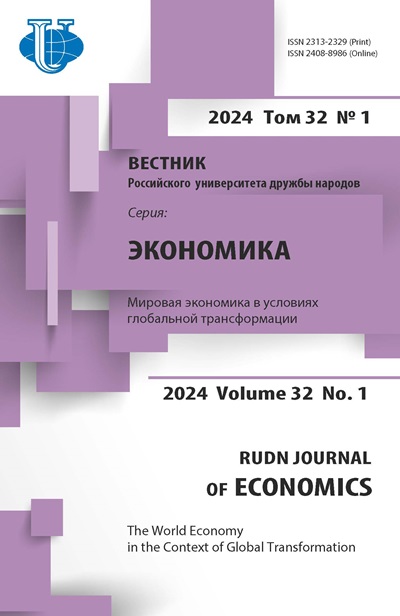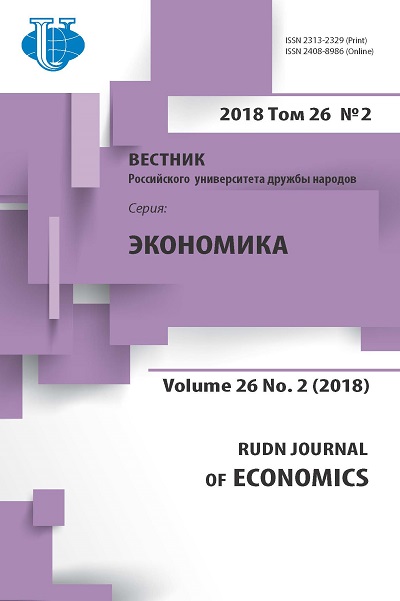TRANSFORMATION OF THE ECONOMIC POLICY OF GEORGIA
- Authors: Andronova IV1, Katamadze A1
-
Affiliations:
- Peoples’ Friendship University of Russia
- Issue: Vol 26, No 2 (2018)
- Pages: 212-223
- Section: GLOBALIZATION AND ECONOMIC INTEGRATION
- URL: https://journals.rudn.ru/economics/article/view/18900
- DOI: https://doi.org/10.22363/2313-2329-2018-26-2-212-223
Cite item
Full Text
Abstract
A new independent state - the Republic of Georgia, formed after the collapse of the USSR during its independent existence, experienced several economic crises, a color revolution, a drop in the standard of living of the population. Despite this, the republic continues to live and develop. The Georgian socio-economic development strategy, Georgia-2020, adopted not so long ago, recorded the state’s commitment to ensure economic growth so that every citizen takes advantage of the achieved results, and at the same time, to enable the inclusion of the population in the process of economic development. One of the mechanisms to achieve the declared goal was the almost complete liberalization of foreign economic activity. Customs duties were almost completely abolished, customs authorities were reformed, all transit duties, quotas and other transit barriers were abolished, liberalization of railway tariff policy was carried out, free industrial and tourist zones were created, restrictions on capital movements were lifted, and so on. In 2018, Georgia ranked 9th in the World Bank’s “Ease of Doing Business”. The purpose of this article is to carry out a comprehensive assessment of the transformation of Georgia’s economic policy and assess its impact on the socio-economic development of the country.
About the authors
I V Andronova
Peoples’ Friendship University of Russia
Author for correspondence.
Email: aiv1207@mail.ru
doctor of economic sciences, professor of International economic relations department at People’s Friendship University of Russia
6, Miklukho-Maklaya str., Mosco, 117198w, Russian FederationA Katamadze
Peoples’ Friendship University of Russia
Email: katamadze.a.a@gmail.com
PhD student of International economic relations department at People’s Friendship University of Russia
6, Miklukho-Maklaya str., Mosco, 117198w, Russian FederationReferences
- Bol’shaya sovetskaya ehnciklopediya. URL: http://bse.sci-lib.com (data obrashcheniya: 05.03.2018). (in Russ).
- Danilov-Danil’yan V.I. Ustojchivoe razvitie: 20 let sporov // V monografii Ekonomicheskaya ehffektivnost’ razvitiya Rossii. Pod red. prof. K.V. Papenova. M., 2007. S. 475. (in Russ).
- Zav’yalova E.B. Nacional’naya ehkonomicheskaya bezopasnost’ Rossii. Vneshneehkonomicheskie svyazi. 2005. T. 17. № 5. (in Russ).
- Zav’yalova E.B., Radishcheva N.V. Ekonomicheskaya geografiya v skhemah i tablicah. M.: Izdatel’stvo Prospekt, 2005. S. 346. (in Russ).
- Zakon Gruzii o Svobodnyh industrial’nyh zonah. URL: https://www.alservice.ge/wp-content/ uploads/2017/01/%D0%9E-%D1%81%D0%B2%D0%BE%D0%B1%D0%BE%D0%B4%D0%BD%D1%8B%D1%85-%D0%B8%D0%BD%D0%B4%D1%83%D1%81%D1%82%D1%80%D0%B8%D0%B0%D0%BB%D1%8C%D0%BD%D1%8B%D1%85-%D0%B7%D0%BE%D
- %BD%D0%B0%D1%85-12-04-2014.pdf (data obrashcheniya: 15.01.2018). (in Russ).
- Zakon Gruzii o sodejstvii razvitiyu svobodnyh turisticheskih zon. URL: https://matsne.gov.ge/ru/ document/download/1073482/5/ru/pdf (data obrashcheniya: 18.01.2018). (in Russ).
- Narodnoe hozyajstvo SSSR v 1990 godu. Statisticheskij ezhegodnik. Goskomstat SSSR. M., 1991. S. 643 (in Russ).
- Strygin A.V. Geoehkonomika: ot metoda poznaniya k metodu dejstviya. Vestnik Rossijskogo universiteta druzhby narodov. Seriya: Ekonomika. 2015. No. 2. S. 7—13 (in Russ).
- Georgia. Tourism Strategy: 2015/2025. Ministry of economy and sustainable development, Georgian National Tourism Administration. 2015.















